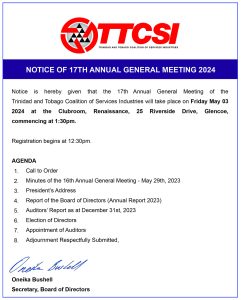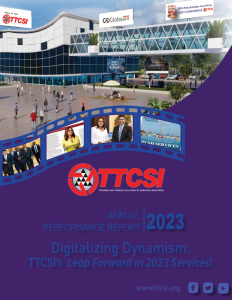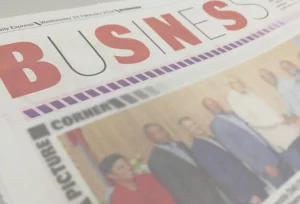President of the TTCSI, Larry Placide,
Mr Peter Kageyama, Founder of the Creative Cities Summit and our Feature Speaker tonight
Permanent Secretary in Ministry of Trade & Industry, Mr Carl Francis,
Members of the Board of Directors of TTCSI
Officials of Government Ministries,
Staff of the TTCSI,
Ladies and Gentlemen,
Members of Media,
A pleasant good evening and a warm welcome to you all.
My name is Nirad Tewarie, The CEO of the T&T Coalition of Services Industries. Many of you already know that the TTCSI was established less than three years ago to represent the interests of the services sector.
Since then, the TTCSI has been an integral part of the business community and, as an umbrella body, it has grown to the point where we now represent 25 sector associations, representing some 70% of the services sector.
Currently we are working with stakeholders to form the Private Hospitals Association and a printing and packaging association; we are actively engaged in the upcoming negotiations with Canada having submitted several policy documents which represent the views of our members. We are also working closely with the Ministry of Trade and International Agencies such as Caribbean Export and the Commonwealth Secretariat on implementation of the Economic Partnership Agreement with the European Union; with Caribbean Export, the Office of Trade Negotiations and other Coalitions in the region on Mutual Recognition Agreements which will allow the qualifications of Architects, Engineers and Accountants to be recognized in the various European countries, thereby enabling them to export their services more easily.
But tonight, we are here to Open National Services Week. This is a project which the TTCSI started last year and which we intend to continue annually. As you would have seen from our ads, we are targeting several sectors over the course of the week. Tonight’s event however, will set the tone.
During the week, our activities will focus on assessing the strengths and weaknesses of the services sector on the one hand and identifying export opportunities on the other. While we at TTCSI, believe that the development of export capacity in the sector is key, this cannot be done without a facilitatory regulatory and policy environment at home.
Despite the establishment of the Yachting Council, the Yachting and marine services sector feels as though they are being ignored.
Despite the explosion of government-led construction, the government and the local construction industry are at loggerheads.
Despite the formation of the ICT cluster through E-tecK, the ICT sector still feels as though the potential and current capacity of the sector are being taken for granted.
If Trinidad and Tobago is going to mitigate its vulnerability to external shocks, particularly those of an economic nature, we need deepen our dialogue with a view to finding common ground and resolving the issues which are preventing us from galloping ahead.
In this vein we must embrace our natural advantages, inherent skills and foster a culture of innovation and creation.
In the introduction to his new book, Who Is Your City, Professor Richard Florida cites his appearance on the popular American television Programme, the Colbert Report, where the host zeros in on a piece of data quoted in the book. Colbert highlighted the fact that Professor Florida found that property values are higher and rise faster in areas with relatively high populations of artists and homosexuals.
What does this have to do with innovation and creation? Well, Professor Florida argues that tolerance and openness are preconditions for innovation and creation and both innovation and creation are necessary to increase productivity and output.
My point is that in order to make our society an innovation society we must, among other things:
1) Find ways for all citizens to participate – and feel as though they are participating – in the economy, the society and national discourse regardless of where they come from, their religious or ethnic background, their sexual orientation or their political affiliation.
2) Accept that differing points of view, alternative points of view and dissent are signs of a society on the move. Dissent allows us to refine our own ideas, incorporate factors which we may have overlooked and fosters participation, which leads to buy in.
3) Be realistic about where we are; clear on where we want to be and targeted and focused with a plan to get there.
In one of my University classes, an assistant lecturer told the class that he was struggling to put his finger on that one thing that makes someone a Trinbagonian. He asked us if we had any ideas. After some thought, I said, “freedom”. Trinis love to be free. The feeling of freedom in itself fosters creativity and innovation and we must embrace that.
Quite opposite from feeling ashamed that former Singaporean Prime Minister Lee Quan Yew once said that T&T cannot progress because of our Carnival mentality, we have to harness that mentality – work hard and play harder – into productive activities.
Several services sub-sectors have the potential for immediate expansion. We have to think of export not just as going abroad and selling services or goods but, in the services sector, sale via the internet, phone or even through video conferencing and the sale of services to foreigners right here in Trinidad and Tobago are also forms of export. And we must develop these modes of export as well.
Hence the reason we will be focusing on cultural, sport, health and education tourism over the course of the week’s activities, the details of which can be found on our website at www.ttcsi.org.
I must point out that none of these activities would be possible without the support of the Ministry of Trade and Industry – a point on which Mr Placide will elaborate but, I too would like to place on record my personal thanks for the Ministry’s support. We must also thank Caribbean Export, U Caribbean Health Digest, Illuminat, Westshore Private Hospital, High Definition Audio and Video Productions, The Trinidad and Tobago Guardian, Atlantic LNG, Guardian Life & NEDCO.
Additionally the TTCSI team – Florence, Sherry, Patrice & Ria – have been working extremely hard to ensure that everything comes off successfully.
So, we invite you to enjoy the evening and encourage you to attend some of the week’s events.
For now though, I take great pleasure in inviting the person who has been the backbone and driving force behind TTCSI to address us.
Larry Placide has been the President of TTCSI for the past year and a half. A former diplomat, Mr Placide is currently the Principal Consultant at Ideas to Business Limited and the Director of the International Trade Negotiating Unit at the Chamber of Commerce. He is also the alternate Lead Negotiator on Services and Investment for CARICOM in the upcoming negotiations on a trade and development agreement with Canada.
I now invite President of the TTCSI Larry Placide to the podium to address us.
Thank you for your attention.





